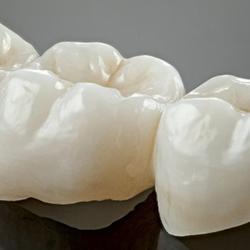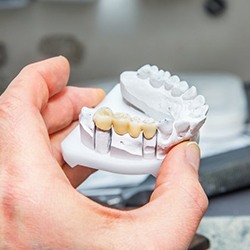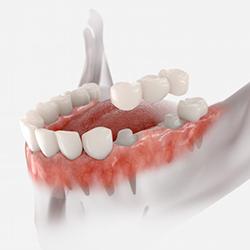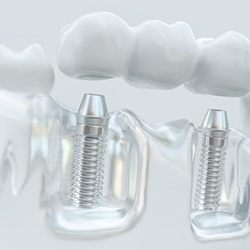Dental Bridges – Lisle, IL
Complete Your Smile After Tooth Loss

Many people have lost one tooth or several sequential teeth due to infections, injuries, or other causes. Luckily, dental bridges have successfully addressed this sort of tooth loss for decades. These reliable dental appliances are sturdy and lifelike, allowing patients to chew a wide variety of foods and enjoy a complete and beautiful smile. Here’s a brief guide to how the team at Arbor Dental Care can help you achieve a complete grin, but please contact our office if you have any questions.
Why Choose Arbor Dental Care for Dental Bridges?
- Skilled and Compassionate Dentists
- Strong and Beautiful Restorations
- We Welcome Insurance
What Is a Dental Bridge?

A dental bridge is several dental crowns strung together, and it is used to replace a single missing tooth or several missing teeth in a row. These appliances are made of high-quality ceramic materials and supported by either healthy teeth or dental implants placed on either side of the gap so they can discreetly restore a smile. The process of receiving dental implants is minimally invasive, so almost anyone can be a good candidate for them as long as they have healthy gums and healthy teeth.
Types of Dental Bridges

There are several types of dental bridges available, and the one that is right for you depends on your needs and preferences. Our team may recommend:
Traditional Dental Bridge

A traditional dental bridge can treat one or several missing teeth by being anchored by dental crowns placed on the teeth on either side of the gap. This appliance requires these anchor teeth to be in good health so they can provide a sturdy foundation that allows it to function like the real thing.
Implant Bridge

Rather than using crowns placed on neighboring teeth, implant bridges are supported by dental implants placed directly into the jawbone on either side of the gap. This requires no alteration of healthy teeth and allows for superior chewing power, and it requires the patient to have healthy gums and jawbones in order for the implant placement surgery to be successful
The Benefits of Getting a Dental Bridge

Dentists recommend replacing lost teeth as soon as possible to prevent issues like:
- Neighboring teeth falling out of misalignment
- Diminished confidence
- Difficulties with speech and chewing
- Increased risk of oral health problems such as dental injuries.
A dental bridge may be a great way to keep your face, attitude, and smile in great shape after losing one or a few teeth. Scheduling a consultation at our Lisle office can put you on the path to enjoying a complete grin.
Dental Bridges FAQs
Are Dental Bridges Removable?
Placing a dental bridge allows your dentist to replace one or several missing teeth in a row with a single versatile prosthetic to close the spaces in your smile. However, many patients are unsure what to expect from their restoration and have questions, like whether it’s intended to be taken out of your mouth regularly.
Some healthcare providers refer to partial dentures as “removable bridges,” which can be confusing if you don’t already know the difference between the two treatments. Partial dentures can restore several missing teeth and are held in place by metallic clips. Meanwhile, a bridge is a single prosthetic containing the correct number of pontics, cemented over abutment teeth or implants in your mouth, and is meant to stay put.
What are Dental Bridges Made Of?
In the past, bridges and other restorations were typically made from gold or metal alloys because of their strength and durability. Although amalgam dental work is incredibly resilient, it also can detract from your appearance because it’s not tooth-colored and can draw unwelcome attention. Plus, metallic materials are sensitive to changes in temperature and can expand and contract when you eat hot or cold foods, which can eventually damage your enamel.
At our practice today, Drs. Frank and Jeanelle Marchese utilize resilient porcelain for restorations instead. This material can be customized to match shade, shape, and size of your natural teeth. Plus, it reflects light like enamel for more seamless results.
Is Getting a Dental Bridge Painful?
Replacing missing teeth can be intimidating, especially if you’re worried your chosen procedure might hurt. Rest assured, Dr. Marchese will administer a local anesthetic before starting your treatment to prevent the nerves in your teeth, gums, or jaw from sending pain signals to your brain. Our team also offers nitrous oxide and oral conscious sedation for overly anxious patients or anyone who has a strong gag reflex or struggles to sit still for longer periods.
Then, they must prepare the abutment teeth by removing a small amount of enamel so the crowns on both ends of your bridge fit over them correctly. This can cause sensitivity afterward but usually fades on its own after a few days. If you experience persistent or severe discomfort, contact our office in Lisle so we can ensure you’re recovering properly.
How Long Do Dental Bridges Last?
It’s natural to wonder how long your new teeth will be with you, though the answer depends on your unique situation. Typically, these restorations last anywhere from 5 to 15+ years, but it can be more or less based on their construction and location in your mouth.
For example, amalgam bridges placed over molars might last longer than porcelain prosthetics in the back of your mouth because they’re better able to withstand the additional pressure from chewing. However, the difference in materials is often negligible. Also, implant-supported bridges tend to be more resilient because the titanium rod won’t eventually wear down or decay like natural abutment teeth do over time.
You can extend your new teeth’s lifespan by brushing and flossing twice daily and visiting our team every six months for a routine checkup and cleaning.


